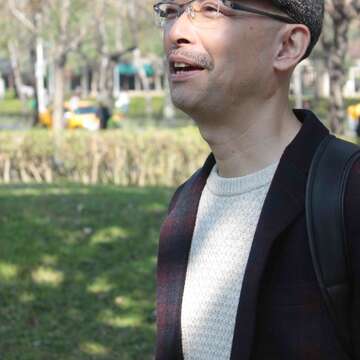Post date:2016-06-16
Updates:2016-08-23
1443
Article _ Kao Looky, Chiang Hsinying
Photos _ Dandelion Music Communications
The me before 50, compared to the me after 50, is as though from a previous life. —Masaki Baba
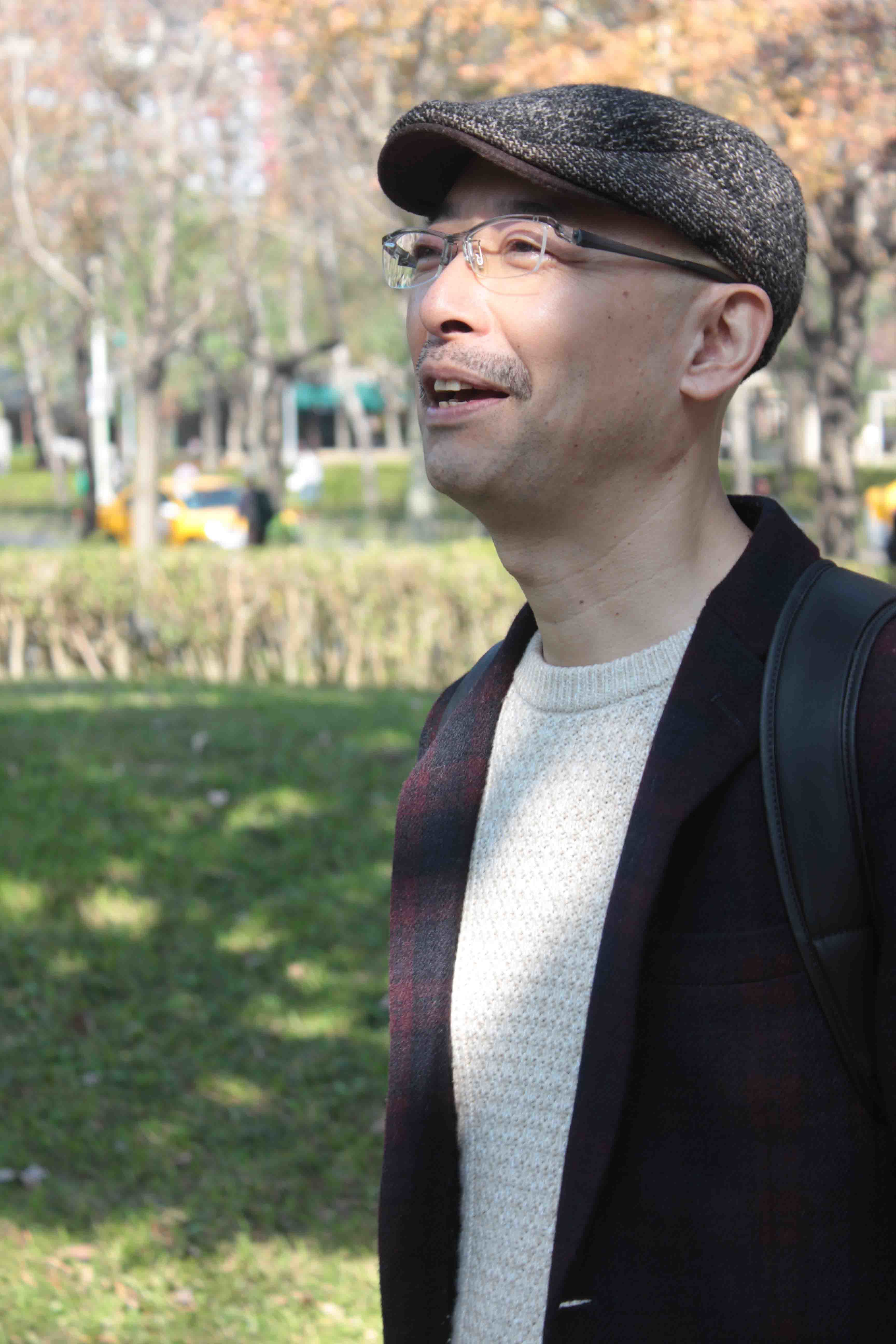
Masaki Baba in Linsen Park (Photo: Kao Looky)
From Diplomat to Performer Two Forms of Communication, In a Life Lived True
In May 2007, Masaki Baba came to Taiwan to take up his new post, Director of Cultural Affairs at the Interchange Association ( Japan) Taipei Office. His time was spent org ani z ing myriad exchange activities, conducting scholarship interviews, cutting ribbons at a multitude of events, and giving speeches, all part of his role as a Taiwan-Japan cultural communication bridge. Each morning, sporting suit and tie and riding the metro to work, Masaki would stop at the same sandwich vendor along the way to buy his breakfast. Rain or shine, the lady who ran the stand would say “Have a good day” to him. Each time this happened, it was like a little grain of happiness being built up. He was later inspired to write a song, entitled “A Little Grain of Happiness” (一毫米的幸福), expressing the idea that true happiness builds up daily in drips and drops. Says Masaki: “Misfortune is an impactful event, but things will change with time. Happiness is a kind of energy and strength, and this can be tempered and increased through training.”
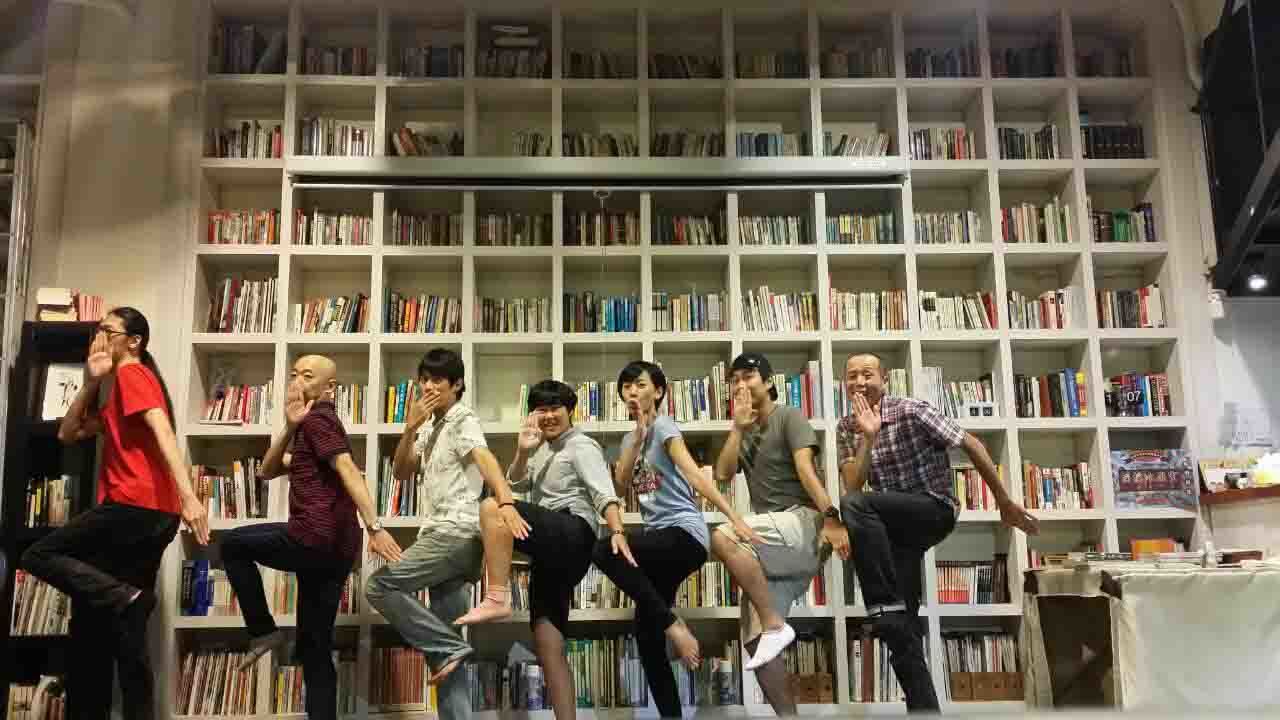
Drama’s Hotel performed Romance Bookstore in Dadaocheng’s Thinkers’ Theatre.
When he was young, Masaki discovered he had an interest in music, as well as talent. However, during his university years he became discouraged, entering many singing competitions but enjoying little success. After entering society, his busyness with diplomatic work soon made him forget he was once so keen on music. Then, to his surprise, upon coming to live in Taipei he found himself writing a new song about once a month about his experiences, expressing his feelings about Taiwan’s rich natural environment and local customs. Reflecting on this outburst of inspired creativity, he smiles and says: “Perhaps I was meant for Taipei.” Giving up the generous salary and benefits of a career diplomat to become an independent creative artist has meant a major life change for Masaki. After being posted in Taiwan for about a year, one day he came across an article on a blog that was entitled “When You Were 20, What Kind of Person Did You Dream of Being ? When You’re 60, What Kind of Person Do You Think You’ll Be?” He stopped to think about his own case, and said to himself, “When I was 20 I thought about being a singer. At 60, what will I be doing?” At this moment a tableau appeared before his eyes. Masaki saw himself at an unknown elementary school/nursing home, playing a guitar and happily singing for the old folks and children. Everyone was joyously singing along, their smiling faces vivid. Suddenly, he realized what he really wanted to do – to sing and be happy, to share and be happy. “My life before 50, compared to who I am today, is like a past life,” he says. “The little bits of happiness that accumulated during those days led to who I am today, but today I am walking a different life path.”
Singer-Songwriter and Actor to Writer – An Odd Old Japanese Man’s Non-Traditional Cultural Participation
Masaki’s best-known musical work is the theme song By the Sea (很靠近海), created for the 2012 Taiwan film Touch of the Light(逆光飛翔), in which he also made a cameo appearance in a small role. The Japanese pronunciation of the characters in his family name (馬場) is “baba,” the same as the Taiwanese pronunciation for “father/dad” (爸爸), some Taiwanese friends call him “Baba-san” (爸爸桑). Masaki uses the power of song to travel “round-island” (環島), interweaving Taiwan’s famous scenic sights into his lyrics. For example, in one of his tunes, “Hot Springs Village Beitou” (溫泉鄉‧北投) , one section goes thus: “Tangshou Guanyin, Budong Mingwang, Geothermal Valley/Music wafts to one’s ears, stirring cherished memories / This is Beitou, this place is Beitou / Hot-spring spa for two.” Using a nostalgic traditional nakashi (那卡西) singing style, his reinterpretation creates a new Taiwan sound. The average Taiwan resident is likely unfamiliar with Beitou’s Tangshou Guanyin (湯守觀音) and Budong Mingwang (不動明王); Masaki’s warm singing gives people the chance to get to know these two deities. “My hope is that Japanese people can learn more about Taiwan through my songs,” he says, “and if they help my Taiwan friends to get reacquainted with their island, all the better.”
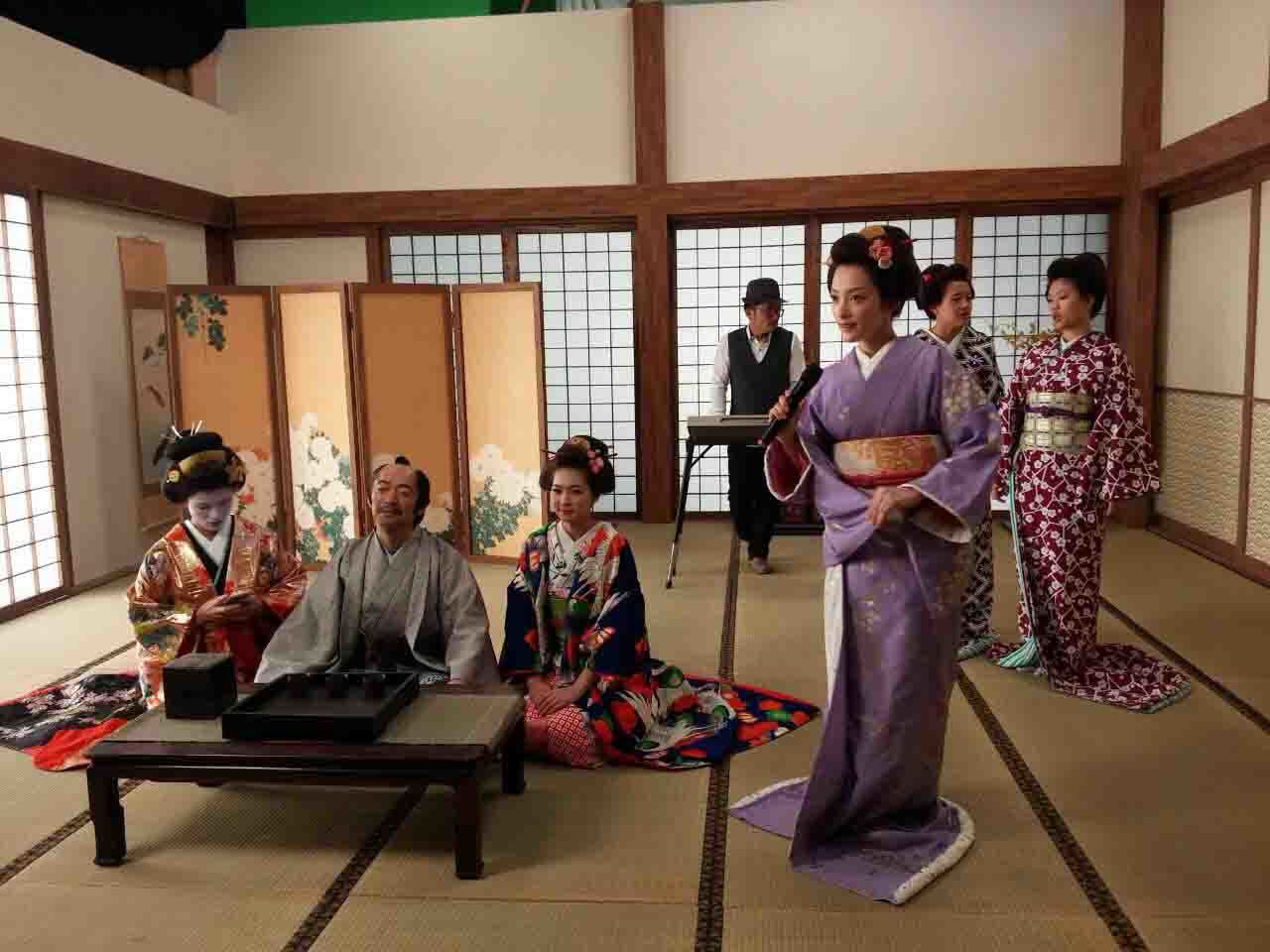
Masaki Baba in the “Daikin Tale of the Cold Palace” commercial, playing General Tokugawa (second from left)
In 2014, Masaki’s close friend Johnny Matsuda, an actor, director, and playwright, formed the Taiwan troupe Drama’s Hotel (戲劇大飯店). Masaki and comedy entertainer Kenji Kasai joined up, and last year in September the troupe performed the stage comedyBook Store Romance (浪漫書店) on Dihua Street. Bringing the spirit of Japanese-style comedy to the traditional/modern mix of Dihua Street created a wholly new mix-andmatch type of comedy. Mandarin Chinese, Japanese, and other voices were melded. Chuckling, Masaki states that “The senior actor Michio says I have style, with a real flair for acting!” More recently, he’s moved from the big screen and big stage of movies and theatre to the small screen of television, and become ever more recognizable. He’s done a Japan promotion-week commercial for Carrefour and Daikin air-conditioning and air purifier commercials, and played the hotheaded, explosive Japanese noodle master in a Vedan instant-noodles ad. He also played Japanese artist Kotou Kuohara in the television drama series Purple Dadaocheng, (紫色大稻埕). The former buttoned-up diplomat has become a real showman! Beyond this, he has represented a
Japanese magazine for interviews with producer Te-Sheng Wei (魏德聖), director Boya Umin introducing the film KANO, and music-score composer Cheer Chen (陳綺貞). Says Masaki: “It seems I’ve done a lot of different things, but the foundation common to all is that I’m a performer. I love Taiwan, and I want to express its beauty.”
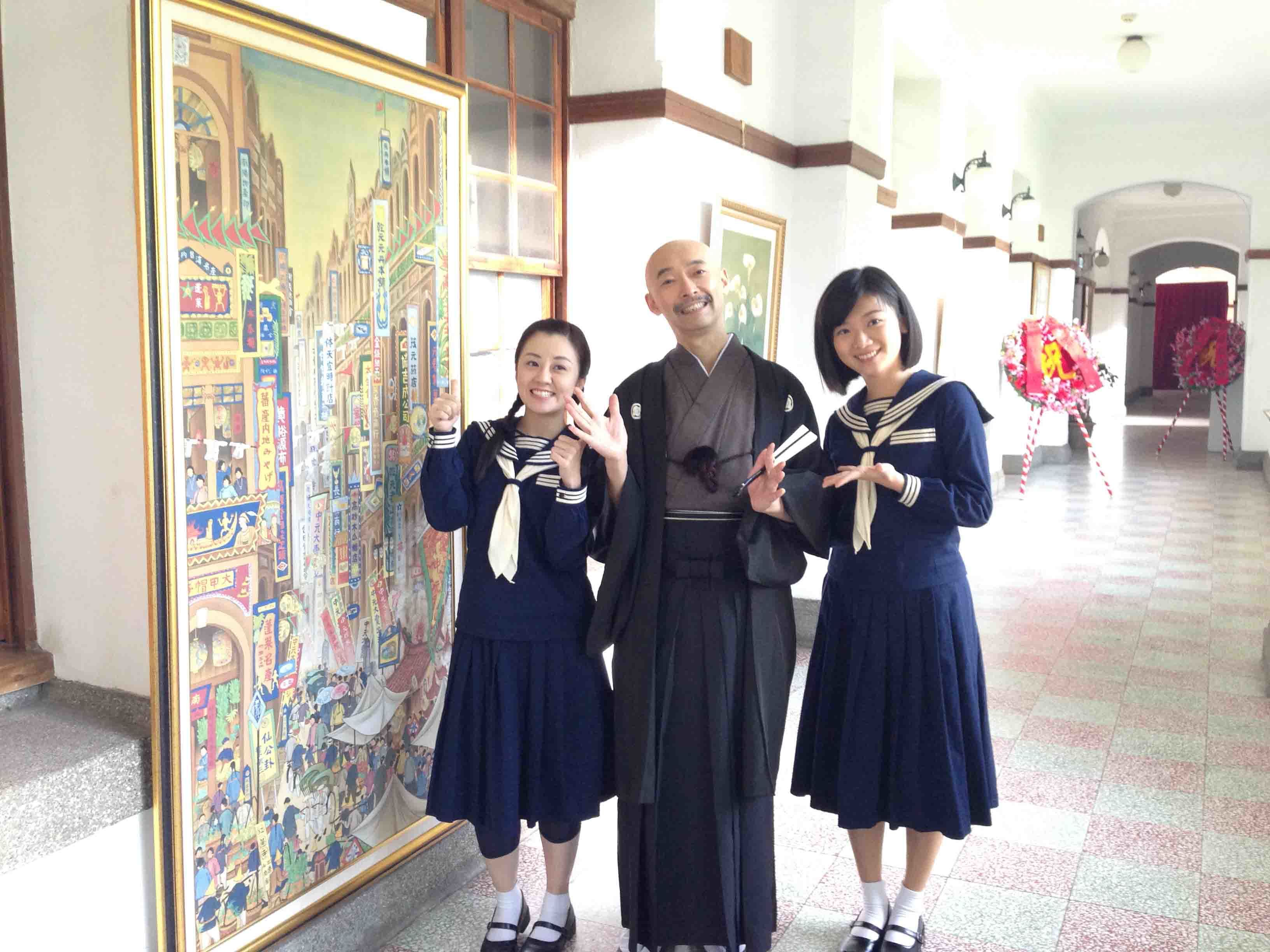
Masaki Baba (middle) in the Sanlih E-Television drama series Purple Dadaocheng , playing artist Xuehu Guo’s painting teacher Kotou Kuohara
Taipei – Dreams of a Promised Land
So, where is “home” for Masaki Baba? Though born in Sendai, he only lived there for just over a year before a series of moves began, with time in Shizuoka and Saitama, college years at Hokkaido University, a move to Tokyo upon being hired by The Japan Foundation (under the Ministry of Foreign Affairs), postings in Beijing, Sydney in Australia⋯. After these many years, Taipei is the city he has lived in longest, and the place for which he has the deepest feeling of “hometown.” Beyond his theatre-troupe partners Kenji Kasai and Johnny Matsuda, Masaki also keeps in regular touch with a group of other Japanese friends who love Taiwan, including Yuka Aoki (青木由香), author of The Best Taiwan (最好的台灣), and Junichi Kinoshita (木下諄一), author of Notes on Taiwan Days (隨筆台灣日子). “Different people introduce Taiwan on different levels, using text and photographs,” says Masaki. “I hope that I can use song to express the feelings that I have for Taiwan.”
After ten years, Taipei is today a place of many cultural-creative shops and comely cafes, and Masaki is pleased to see how Taiwan’s young people have the courage to express their opinions, and work to change the political map. His favorite Taipei places, beyond Dadaocheng , with its fusion of the old-time and the innovative, and Yangmingshan, with its completely different landscapes through the four seasons, is the National Taiwan University campus, which fills him with nostalgia for his alma mater, the University of Hokkaido. He loves hunting for different walking routes to explore, and has lately developed a keen affection for YouBike city adventures. And even though he’s still not accustomed to the Taipei weather – “hot and sticky summers, cold and damp winters that feel colder than in Japan” – he creatively describes the subtropical winds as warmheartedness that wraps itself around your body, and says that the city’s noisy scooter/ motorcycle “battle-array parades” have imperceptibly become a part of the backdrop to his daily routine.
Promised Land Corners brimming with human warmth,
Promised Land Gentle, moist subtropical breezes wreathe my body.
Parting from and encountering, interwoven and superimposed is the me of today.
Under a brilliant sky, all and everything is connected.
Promised Land My soft humming is drowned in the roar
of the motorbike battle arrays,
Promised Land And I too slowly, slowly disappear into the streetscape.
—Masaki Baba
Photos _ Dandelion Music Communications
The me before 50, compared to the me after 50, is as though from a previous life. —Masaki Baba

Masaki Baba in Linsen Park (Photo: Kao Looky)
From Diplomat to Performer Two Forms of Communication, In a Life Lived True
In May 2007, Masaki Baba came to Taiwan to take up his new post, Director of Cultural Affairs at the Interchange Association ( Japan) Taipei Office. His time was spent org ani z ing myriad exchange activities, conducting scholarship interviews, cutting ribbons at a multitude of events, and giving speeches, all part of his role as a Taiwan-Japan cultural communication bridge. Each morning, sporting suit and tie and riding the metro to work, Masaki would stop at the same sandwich vendor along the way to buy his breakfast. Rain or shine, the lady who ran the stand would say “Have a good day” to him. Each time this happened, it was like a little grain of happiness being built up. He was later inspired to write a song, entitled “A Little Grain of Happiness” (一毫米的幸福), expressing the idea that true happiness builds up daily in drips and drops. Says Masaki: “Misfortune is an impactful event, but things will change with time. Happiness is a kind of energy and strength, and this can be tempered and increased through training.”

Drama’s Hotel performed Romance Bookstore in Dadaocheng’s Thinkers’ Theatre.
When he was young, Masaki discovered he had an interest in music, as well as talent. However, during his university years he became discouraged, entering many singing competitions but enjoying little success. After entering society, his busyness with diplomatic work soon made him forget he was once so keen on music. Then, to his surprise, upon coming to live in Taipei he found himself writing a new song about once a month about his experiences, expressing his feelings about Taiwan’s rich natural environment and local customs. Reflecting on this outburst of inspired creativity, he smiles and says: “Perhaps I was meant for Taipei.” Giving up the generous salary and benefits of a career diplomat to become an independent creative artist has meant a major life change for Masaki. After being posted in Taiwan for about a year, one day he came across an article on a blog that was entitled “When You Were 20, What Kind of Person Did You Dream of Being ? When You’re 60, What Kind of Person Do You Think You’ll Be?” He stopped to think about his own case, and said to himself, “When I was 20 I thought about being a singer. At 60, what will I be doing?” At this moment a tableau appeared before his eyes. Masaki saw himself at an unknown elementary school/nursing home, playing a guitar and happily singing for the old folks and children. Everyone was joyously singing along, their smiling faces vivid. Suddenly, he realized what he really wanted to do – to sing and be happy, to share and be happy. “My life before 50, compared to who I am today, is like a past life,” he says. “The little bits of happiness that accumulated during those days led to who I am today, but today I am walking a different life path.”
Singer-Songwriter and Actor to Writer – An Odd Old Japanese Man’s Non-Traditional Cultural Participation
Masaki’s best-known musical work is the theme song By the Sea (很靠近海), created for the 2012 Taiwan film Touch of the Light(逆光飛翔), in which he also made a cameo appearance in a small role. The Japanese pronunciation of the characters in his family name (馬場) is “baba,” the same as the Taiwanese pronunciation for “father/dad” (爸爸), some Taiwanese friends call him “Baba-san” (爸爸桑). Masaki uses the power of song to travel “round-island” (環島), interweaving Taiwan’s famous scenic sights into his lyrics. For example, in one of his tunes, “Hot Springs Village Beitou” (溫泉鄉‧北投) , one section goes thus: “Tangshou Guanyin, Budong Mingwang, Geothermal Valley/Music wafts to one’s ears, stirring cherished memories / This is Beitou, this place is Beitou / Hot-spring spa for two.” Using a nostalgic traditional nakashi (那卡西) singing style, his reinterpretation creates a new Taiwan sound. The average Taiwan resident is likely unfamiliar with Beitou’s Tangshou Guanyin (湯守觀音) and Budong Mingwang (不動明王); Masaki’s warm singing gives people the chance to get to know these two deities. “My hope is that Japanese people can learn more about Taiwan through my songs,” he says, “and if they help my Taiwan friends to get reacquainted with their island, all the better.”

Masaki Baba in the “Daikin Tale of the Cold Palace” commercial, playing General Tokugawa (second from left)
In 2014, Masaki’s close friend Johnny Matsuda, an actor, director, and playwright, formed the Taiwan troupe Drama’s Hotel (戲劇大飯店). Masaki and comedy entertainer Kenji Kasai joined up, and last year in September the troupe performed the stage comedyBook Store Romance (浪漫書店) on Dihua Street. Bringing the spirit of Japanese-style comedy to the traditional/modern mix of Dihua Street created a wholly new mix-andmatch type of comedy. Mandarin Chinese, Japanese, and other voices were melded. Chuckling, Masaki states that “The senior actor Michio says I have style, with a real flair for acting!” More recently, he’s moved from the big screen and big stage of movies and theatre to the small screen of television, and become ever more recognizable. He’s done a Japan promotion-week commercial for Carrefour and Daikin air-conditioning and air purifier commercials, and played the hotheaded, explosive Japanese noodle master in a Vedan instant-noodles ad. He also played Japanese artist Kotou Kuohara in the television drama series Purple Dadaocheng, (紫色大稻埕). The former buttoned-up diplomat has become a real showman! Beyond this, he has represented a
Japanese magazine for interviews with producer Te-Sheng Wei (魏德聖), director Boya Umin introducing the film KANO, and music-score composer Cheer Chen (陳綺貞). Says Masaki: “It seems I’ve done a lot of different things, but the foundation common to all is that I’m a performer. I love Taiwan, and I want to express its beauty.”

Masaki Baba (middle) in the Sanlih E-Television drama series Purple Dadaocheng , playing artist Xuehu Guo’s painting teacher Kotou Kuohara
Taipei – Dreams of a Promised Land
So, where is “home” for Masaki Baba? Though born in Sendai, he only lived there for just over a year before a series of moves began, with time in Shizuoka and Saitama, college years at Hokkaido University, a move to Tokyo upon being hired by The Japan Foundation (under the Ministry of Foreign Affairs), postings in Beijing, Sydney in Australia⋯. After these many years, Taipei is the city he has lived in longest, and the place for which he has the deepest feeling of “hometown.” Beyond his theatre-troupe partners Kenji Kasai and Johnny Matsuda, Masaki also keeps in regular touch with a group of other Japanese friends who love Taiwan, including Yuka Aoki (青木由香), author of The Best Taiwan (最好的台灣), and Junichi Kinoshita (木下諄一), author of Notes on Taiwan Days (隨筆台灣日子). “Different people introduce Taiwan on different levels, using text and photographs,” says Masaki. “I hope that I can use song to express the feelings that I have for Taiwan.”
After ten years, Taipei is today a place of many cultural-creative shops and comely cafes, and Masaki is pleased to see how Taiwan’s young people have the courage to express their opinions, and work to change the political map. His favorite Taipei places, beyond Dadaocheng , with its fusion of the old-time and the innovative, and Yangmingshan, with its completely different landscapes through the four seasons, is the National Taiwan University campus, which fills him with nostalgia for his alma mater, the University of Hokkaido. He loves hunting for different walking routes to explore, and has lately developed a keen affection for YouBike city adventures. And even though he’s still not accustomed to the Taipei weather – “hot and sticky summers, cold and damp winters that feel colder than in Japan” – he creatively describes the subtropical winds as warmheartedness that wraps itself around your body, and says that the city’s noisy scooter/ motorcycle “battle-array parades” have imperceptibly become a part of the backdrop to his daily routine.
Promised Land Corners brimming with human warmth,
Promised Land Gentle, moist subtropical breezes wreathe my body.
Parting from and encountering, interwoven and superimposed is the me of today.
Under a brilliant sky, all and everything is connected.
Promised Land My soft humming is drowned in the roar
of the motorbike battle arrays,
Promised Land And I too slowly, slowly disappear into the streetscape.
—Masaki Baba
 TAIPEI 2016Spring Vol.03—Interpreting His Adopted Hometown Through Music: Masaki Baba’s Sounds of Taipei
TAIPEI 2016Spring Vol.03—Interpreting His Adopted Hometown Through Music: Masaki Baba’s Sounds of Taipei